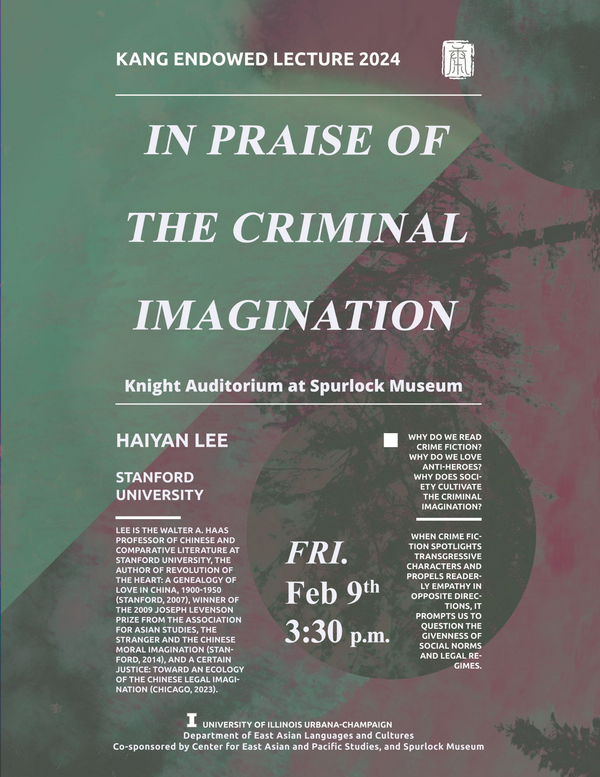
2024 EALC Kang Endowed Lecture | Haiyan Lee "In Praise of the Criminal Imagination"
- Event Type
- Lecture
- Sponsor
- Hosted by: Department of East Asian Languages & Cultures; Co-sponsored by: Center for East Asian and Pacific Studies
- Location
- Knight Auditorium at Spurlock Museum
- Date
- Feb 9, 2024 3:30 pm
- Speaker
- Haiyan Lee (Stanford University)
- Cost
- Free and open to the public
- Contact
- Jingling Chen
- jingling@illinois.edu
- Views
- 180
- Originating Calendar
- CEAPS Events Calendar
Why do we read crime fiction? Why do we love anti-heroes? Why does society cultivate the criminal imagination? When crime fiction spotlights transgressive characters and propels readerly empathy in opposite directions, it prompts us to question the givenness of social norms and legal regimes.
About Haiyan Lee
Haiyan Lee is Walter A. Haas Professor of the Humanities and Professor of East Asian Languages and Cultures and of Comparative Literature at Stanford University. Before joining Stanford in 2009, she taught at the University of Colorado at Boulder and the University of Hong Kong, and held post-doctoral fellowships at Cornell University and Harvard University. Her first book, “Revolution of the Heart: A Genealogy of Love in China, 1900-1950,” is a critical genealogy of the idea of “love” (qing) in modern Chinese literary and cultural history. It is the first recipient of the Joseph Levenson Prize in the field of modern Chinese literature. Her second book, “The Stranger and the Chinese Moral Imagination,” examines how the figure of “the stranger”—foreigner, migrant, class enemy, woman, animal, ghost—in Chinese fiction, film, television, and exhibition culture tests the moral limits of a society known for the primacy of consanguinity and familiarity. Her new book, “A Certain Justice: Toward an Ecology of the Chinese Legal Imagination” investigates Chinese visions of “justice” at the intersection of narrative, law, and ethics.